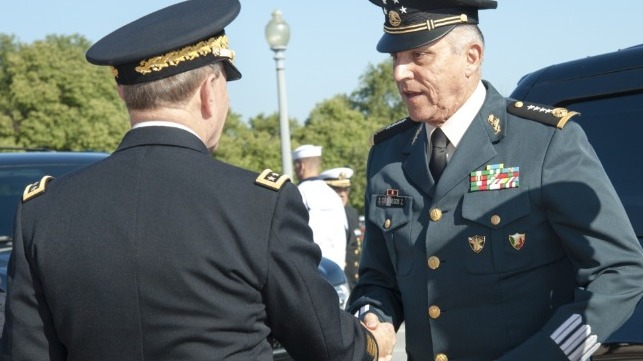Mexico's Ex-Defense Secretary Charged With Helping Cartel Ship Drugs

Mexico's former secretary of defense has been arrested in Los Angeles and charged with using his official post to assist the little-known H-2 Cartel with smuggling, including acting as a maritime shipping agent for narcotics.
The defendant, Gen. Salvador Cienfuegos Zepeda, was Mexico's defense secretary from 2012-2018. Federal prosecutors in the Eastern District of New York contend that Cienfuegos accepted bribes from the H-2 Cartel in exchange for a broad range of services, including "locating maritime transportation for drug shipments."
Cienfuegos also allegedly provided high-level cover, ensuring that no Mexican military operations were launched against H-2, using the military to target H-2's rivals, helping H-2 to expand its territory in Sinaloa and giving the cartel inside intelligence about American investigations into its activities. This intelligence included information about a suspected mole, and it "ultimately resulted in the murder of a member of the H-2 Cartel that the [cartel's] senior leadership incorrectly believed was assisting U.S. law enforcement authorities," prosecutors alleged.
H-2 was a remnant of the larger and better-known Beltran-Leyva Organization (BLO). The leader of H-2, Juan Francisco Patron Sanchez, was killed in a Mexican Navy raid involving a helicopter gunship in 2017; the cartel is now believed to be substantially defunct, like BLO.
"Due in part to the defendant’s corrupt assistance, the H-2 Cartel conducted its criminal activity in Mexico without significant interference from the Mexican military and imported thousands of kilograms of cocaine, heroin, methamphetamine, and marijuana into the United States," asserted acting U.S. Attorney for the Eastern District Seth D. DuCharme.

that matters most
Get the latest maritime news delivered to your inbox daily.
American investigators based their charges against Cienfuegos on a trove of thousands of Blackberry messages that allegedly contain conversations with members of the cartel. The discussions include evidence regarding other high-level Mexican officials that Cienfuegos allegedly put into contact with H-2's leaders.
The arrest raises significant questions about the integrity of Mexico's armed services, which are seen within the country as the least corrupt and most effective national institutions. Given the challenges facing Mexico's civilian agencies, President Andres Manuel Lopez Obrador has leaned heavily on the military to pursue his agenda, putting military engineers in charge of building a new airport for Mexico City, leaving the army in charge of the long-running war on drugs, and even proposing to transfer control of the nation's major seaports to military leaders.
